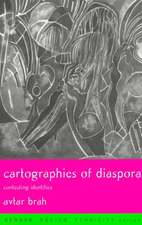Primitive Classification (Routledge Revivals): Routledge Revivals: Emile Durkheim: Selected Writings in Social Theory
Autor Emile Durkheim, Marcel Maussen Limba Engleză Paperback – 18 aug 2010
Dr Needham’s introduction assesses the validity of Durkhiem and Mauss’s argument, traces its continued influence in various disciplines, and indicates its analytical value for future researches in social anthropology.
Preț: 294.23 lei
Preț vechi: 338.90 lei
-13% Nou
Puncte Express: 441
Preț estimativ în valută:
56.31€ • 58.43$ • 47.06£
56.31€ • 58.43$ • 47.06£
Carte tipărită la comandă
Livrare economică 17-31 martie
Preluare comenzi: 021 569.72.76
Specificații
ISBN-13: 9780415567923
ISBN-10: 0415567920
Pagini: 148
Dimensiuni: 138 x 216 x 12 mm
Greutate: 0.2 kg
Ediția:1
Editura: Taylor & Francis
Colecția Routledge
Seria Routledge Revivals: Emile Durkheim: Selected Writings in Social Theory
Locul publicării:Oxford, United Kingdom
ISBN-10: 0415567920
Pagini: 148
Dimensiuni: 138 x 216 x 12 mm
Greutate: 0.2 kg
Ediția:1
Editura: Taylor & Francis
Colecția Routledge
Seria Routledge Revivals: Emile Durkheim: Selected Writings in Social Theory
Locul publicării:Oxford, United Kingdom
Cuprins
1. Introduction 2. The Problem 3. The Australian Type of Classification 4. Other Australian Systems 5. Zuñi, Sioux 6. China 7. Conclusions
Recenzii
‘This is a significant essay because it is the most unqualified expression of its authors’ grand idea that the origins and meaning of mental categories are to be sought in the organisation of societies.’ – The Times Literary Supplement
Descriere
In this influential work, first published in English in 1963, Durkheim and Mauss claim that the individual mind is capable of classification and they seek the origin of the ‘classificatory function’ in society. On the basis of an intensive examination of forms and principles of symbolic classification reported from the Australian aborigines, the Zuñi and traditional China, they try to establish a formal correspondence between social and symbolic classification. From this they argue that the mode of classification is determined by the form of society and that the notions of space, time, hierarchy, number, class and other such cognitive categories are products of society.
Dr Needham’s introduction assesses the validity of Durkhiem and Mauss’s argument, traces its continued influence in various disciplines, and indicates its analytical value for future researches in social anthropology.
Dr Needham’s introduction assesses the validity of Durkhiem and Mauss’s argument, traces its continued influence in various disciplines, and indicates its analytical value for future researches in social anthropology.
















